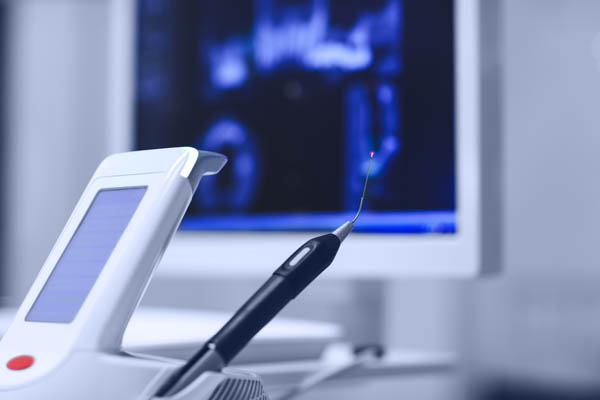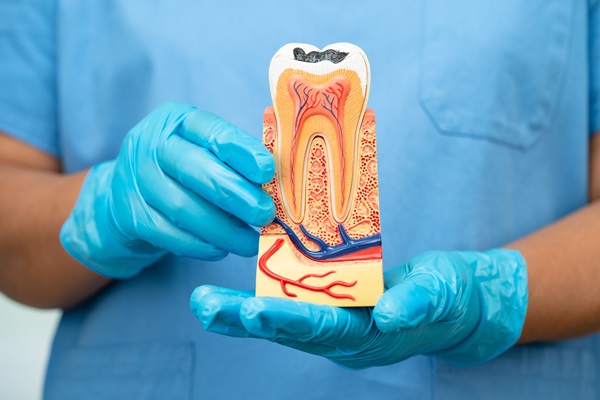Pros and Cons of Laser Dentistry

Thinking about choosing laser dentistry? The Food and Drug Administration (FDA) has approved laser dentistry as a treatment option for several dental conditions. Common conditions include treating gum disease, root canal infections and removing canker sores.
2 types of dental lasers
Understanding what laser dentistry can treat is the first thing someone needs to do when considering this dental treatment option. There are two types of lasers used – one to treat soft tissue problems and one to treat hard tissue problems. Soft tissue lasers are often used to reshape gums, treat cold sores and reduce the number of oral bacteria in one’s mouth. Hard tissue lasers are often used to remove tooth decay and quickly harden dental fillings.
For those who are concerned about the safety of using laser dentistry, when dental lasers are used, know that everyone in the room will need to wear proper eye protection. Dental lasers also do not make any loud noises, which is beneficial for dental patients who experience any type of dental anxiety.
Pros of laser dentistry
There are many pros that come with laser dentistry, which is why so many dental patients are choosing the laser route when in need of certain dental procedures.
#1 – Dental lasers are virtually painless. When soft tissue lasers are used, they will seal the patient's nerve endings and blood tissues at the same time they are penetrating the tissues, which means patients will experience no pain or a minimal amount of pain.
#2 – Laser dentistry decreases the chance of bacterial infection. The fact that dental lasers also sterilize the area being treated, means patients will have a lesser chance of being diagnosed with a bacterial infection after treatment. Lasers not only kill harmful bacteria in the mouth, but they also support the regrowth of new healthy gum tissue.
#3 – Dental lasers support a faster healing time. The reason why dental patients who undergo laser dentistry will heal faster is that this treatment option is a minimally invasive procedure. This means patients can expect to experience less swelling and less bleeding, which in turn, means they can expect to recover faster from their particular dental procedure.
Cons of laser dentistry
There are a few cons that come with laser dentistry, which are important to be aware of prior to undergoing any type of procedure that requires dental lasers.
#1 – Dental lasers cannot treat teeth that already have a dental filling.
#2 – Laser dentistry cannot fill cavities that are located in between teeth.
Is laser dentistry the right choice?
Now that the pros and cons of laser dentistry are understood, those who are in need of certain dental treatments can decide whether or not they want to undergo laser treatment. Since there are not a lot of serious downsides to undergoing laser dentistry, it may be worth considering. Reach out today to learn more or to get started!
Are you considering laser dentistry in the Gibbsboro area? Get more information at https://beautifulmouth.com.
Check out what others are saying about our dental services on Yelp: Laser Dentistry in Gibbsboro, NJ.
Recent Posts
When people experience cavities, the resulting pain can interfere with eating and flare up when the cavity comes in contact with hot or cold foods. A laser dentist can assist with repairing cavities depending on their severity and in a way that reduces the pain typically associated with such a procedure. Those who want to…
Are you thinking about making an appointment with a laser dentist? This recent form of dentistry is becoming more common in both preventive and restorative care. It is helpful to learn more about what this professional can do and how visiting one can benefit your oral health and smile. In laser dentistry, the dentist can…
Considering laser dentistry? As new dental technology becomes available, more people are beginning to consider the practices, especially when it comes to procedures that have been known to cause discomfort. Gum reshaping is a procedure that is known to be pretty uncomfortable because the gums are literally removed in certain areas. However, with the help…
Sedation dentistry might be necessary when feeling anxious or nervous about visiting the dentist for routine care or certain procedures. Dental anxiety is a common condition and it can be caused for a variety of things. Some people have a fear of dentists due to past negative experiences, while others might be afraid of the…


